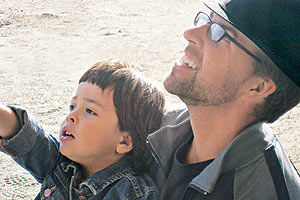In the past week, we've reported on a waffle joint in Oregon that facilitates barter among customers and a cafe in California that asks customers to talk to each other. We've also explored the singular Ogori Cafe in Japan, where you are served what the customer before you orders. They might all sound odd, but these experiments are not unique: everywhere I look, I see the owners of eating and drinking establishments fostering alternative economic and social relationships.
There's at least two village pubs in the United Kingdom where customers can barter goods and services for pints of ale. "If you grow, breed, shoot or steal anything that may look at home on our menu, bring it in and let's do a deal," says the Pigs public house. At the Bugle Horn in Lincolnshire, drinkers can also exchange foods for pints, or volunteer "to wash-up or decorate the pub," among other services.
Many of the owners cite a weak economy and competition from chains as motivation for their experiments.
“I don’t know that our five foot bartering wall will be the thing that turns this local economy in the right direction, but I do think we can make a significant impact,” says Omer Orian, twentysomething co-owner of Off the Waffle in Oregon. He argues that his town possesses ample “human and natural resources” to sustain itself. “The lack of cash flow due to the economy should not stop this city from prospering.”
Meanwhile, the owners of Bugle Horn say barter is a way for independent pubs to compete with special offers at larger chain bars. "We can't compete on the prices — there's no way that we can," co-owner David Hurst tells the BBC. "We try and give something else back to people, we're always open to new ideas."
Note how surviving as a locally owned business seems to go hand in hand with building both the local economy and the community. In the minds of these small entrepreneurs, the survival of one is apparently tied up in the survival of the others, and the owners are asking their customers to join in creating a sharing and shareable space.
Obviously, Omer Orian in Eugene, Oregon has not been talking with David Hurst of Lincolnshire, UK or to the founders of the Ogori Cafe in Japan–they didn't cook up an 8-point program at a conference in Madrid or Montreal. These ideas seem to be arising spontaneously, in response to needs that transcend national borders. Will they continue to spread? Are we seeing the birth of a shareable eats movement, where local restaurants and pubs reinvent themselves as alternative economic zones, designed as much to create community as to make money?
And what do you think? Are we seeing some kind of shift in our idea of what an eatery should be?








